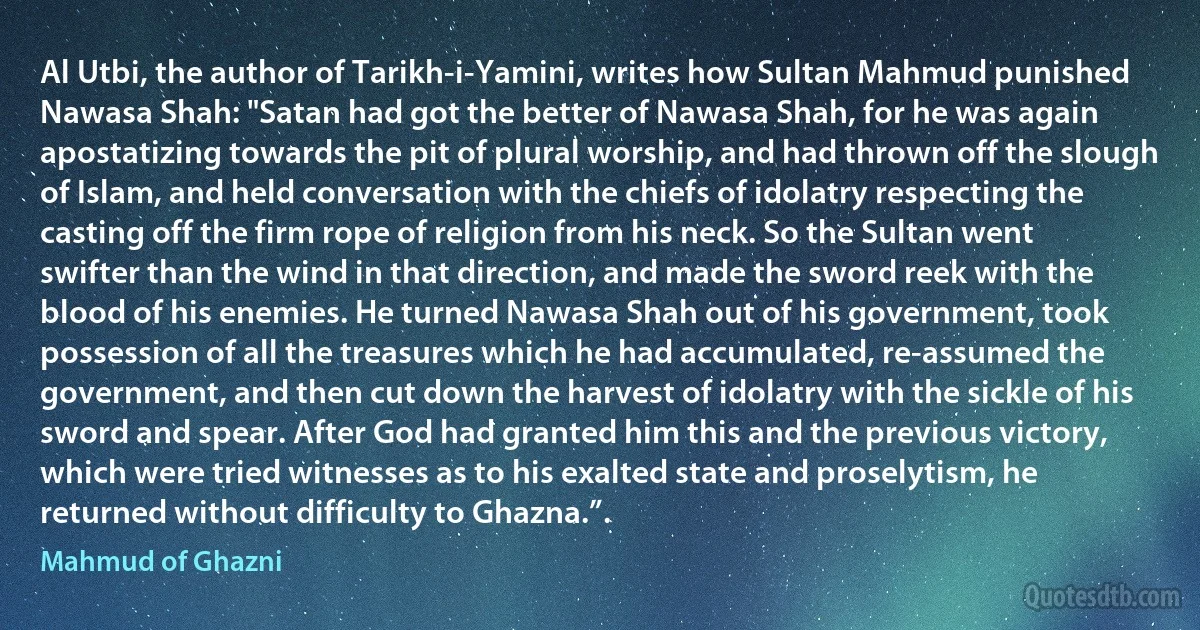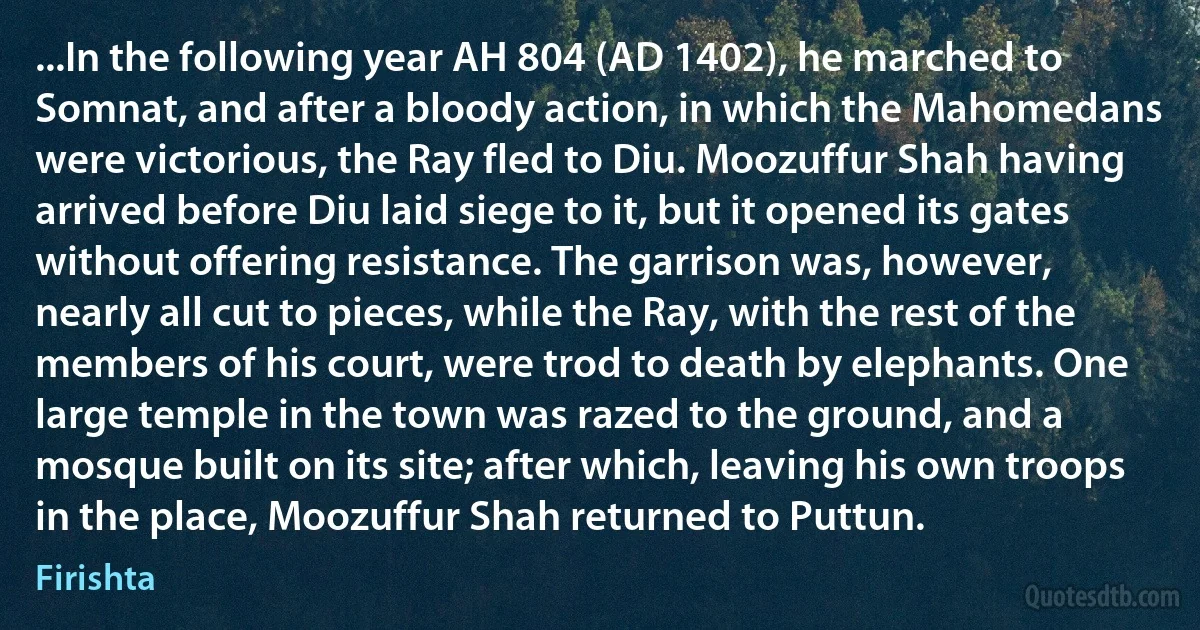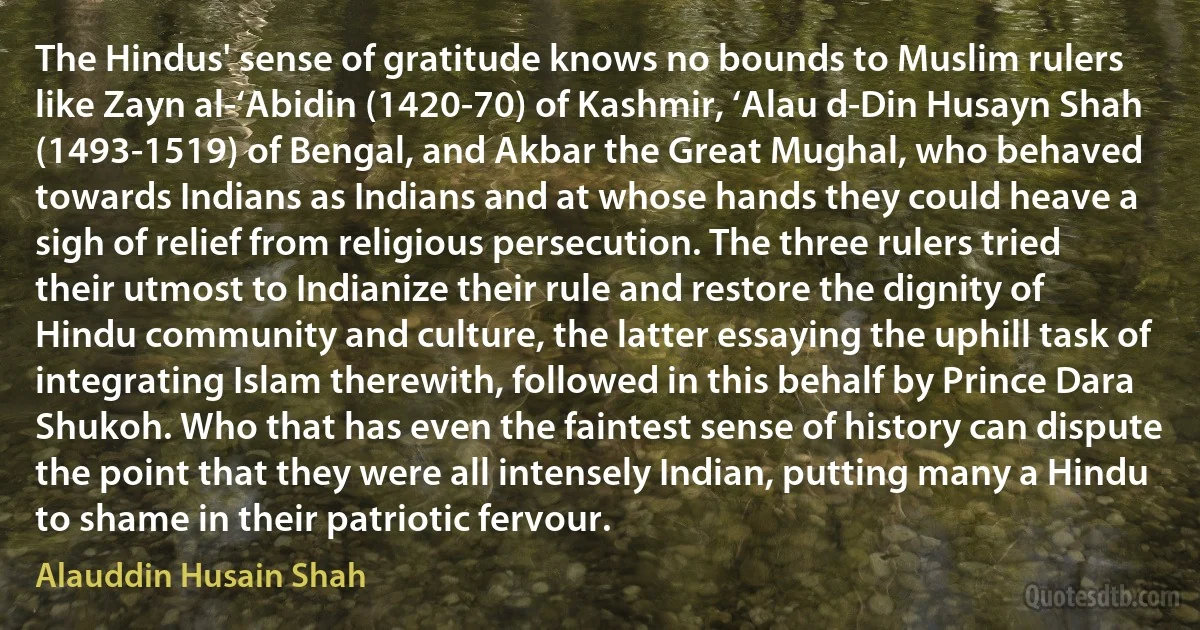Shah Quotes - page 2
The enthusiastic soldiers, who, in the thirteenth and fourteenth centuries, spread the faith of Islam among the timid race of Bengal, made forcible conversions by the sword, and, penetrating the dense forests of the Eastern frontier, planted the crescent in the villages of Sylhet. Tradition still preserves the names of Adam Shahid, Shah Halal Mujarrad, and Karmfarma Sahib, as three of the most successful of these enthusiasts.

Duarte Barbosa
Waliullah had travelled all the way to Mecca and Medina - a difficult and dangerous undertaking in his days - and studied under half a dozen Sufis and savants of ‘Islamic sciences', only to ‘discover' and declare what the meanest mullah in the most obscure village mosque in India had been mouthing for more than a thousand years. He himself wrote as many as 43 books between 1732 and 1762 - thirty thoughtful years - only to re-echo the routine ravings of a thousand theologians who had continued to thunder ever since the advent of Islam in this country! He wrote hundreds of letters to his contemporary Muslim monarchs and mercenaries, including Ahmad Shah Abdali, whom he considered to be the saviours of Islam in India, only to convey the conventional Islamic message which all of them had crammed in their cradles - convert of kill the kãfirs, humiliate the Hindus, and establish an Islamic state in keeping with the ‘holy' commandments of the Quran!

Shah Waliullah Dehlawi
After Aurangzeb's death when Muslim power started to disintegrate, the Sufi scholar Shah Waliullah (1703-1763) wrote to the Afghan King Ahmad Shah Abdali, inviting him to invade India to help the Muslims. The letter said: "...In short the Moslem community is in a pitiable condition. All control of the machinery of the government is in the hands of the Hindus because they are the only people who are capable and industrious. Wealth and prosperity are concentrated in their hands, while the share of Moslems is nothing but poverty and misery... At this time you are the only king who is powerful, farsighted and capable of defeating the enemy forces. Certainly it is incumbent upon you to march to India, destroy Maratha domination and rescue weak and old Moslems from the clutches of non-Moslems. If, Allah forbid, domination by infidels continues, Moslems will forget Islam and within a short time, become such a nation that there will be nothing left to distinguish them from non-Moslems.”.

Shah Waliullah Dehlawi
...I have received your weighty letter...
According to whatever this recluse (meaning himself) has learnt (from the occult world), Ahmad Shah Abdali will come again for putting down the enemies. When this sacred promise is fulfilled, he will most probably stay here, and dedicate his life to the last to (the welfare of) this land. In spite of the crimes that abound and the evils that have multiplied, the work is proceeding according to plan. The reason for this most probably is that Allah wants to destroy the power of his enemies.

Shah Waliullah Dehlawi
Immediately after Akbar's death "Mulla Shah Ahmad, one of the greatest religious leaders of the age, wrote to various court dignitaries exhorting them to get this state of things altered in the very beginning of (Jahangir's) reign because otherwise it would be difficult to accomplish anything later on.”.

Jahangir
The faithful Gabriel carried the tidings to the dwellers in heaven,
From the record of victories of the Sulṭan of the age Shams ud-Din,
Saying - Oh ye holy angels raise upon the heavens,
Hearing this good tidings, the canopy of adornment.
That from the land of the heretics the Shahanshah of Islam
Has conquered a second time the fort resembling the sky;
The Shah, holy warrior and Ghazi, whose hand and sword
The soul of the lion of repeated attacks praises.

Iltutmish
Sultan Firoz Tughlaq writes in his Fatuhat that he appeased by means of gifts the heirs of those who had been deprived of a limb, nose, eye, hand or foot in the time of his late lord and patron Sultan Muhammad Shah. Firoz Tughlaq is known for his kind-heartedness but, according to Shams Siraj Afif, he killed one lakh 80 thousand Bengalis in war. Towers of skulls of the killed were erected. The chronicler adds, "Firoz Shah was near the mound of skulls with all magnificence; and glory and was inspecting the counting of the heads."

Firuz Shah Tughlaq
Why does the monstrous men of an Alauddin Khalji, a Firuz Shah Tughlaq, a Sikandar Lodi, and an Aurangzeb, to name only the most notorious, pop out so soon from the thickest coat of cosmetics?
The answer is provided by the Muslim historians of medieval India. They painted their heroes in the indelible dyes of Islamic ideology. They did not anticipate the day when Islamic imperialism in India will become only a painful memory of the past. They did not visualise that the record of Islam in India will one day be weighed on the scales of human values.

Firuz Shah Tughlaq
Sultãn Fîrûz Shãh composed a book also in which he compiled an account of his reign and which he named Futuhãt-i-Fîrûz Shãhî..."He writes in its second chapter... ‘Muslim and infidel women used to visit sepulchres and temples, which led to many evils. I stopped it. I got mosques built in place of temples'...

Firuz Shah Tughlaq
"...Ally Adil Shah, at the persuasions of his minister, carried his arms against Bunkapoor. This place was the principal residence of Velapa Ray, who had been originally a principal attendant of Ramraj; after whose death he assumed independence... "...Velapa Ray, despairing of relief, at length sent offers for surrendering the fort to the King, on condition of being allowed to march away with his family and effects, which Ally Adil Shah thought proper to grant, and the place was evacuated accordingly. The King ordered a superb temple within it to be destroyed, and he himself laid the first stone of a mosque, which was built on the foundation, offering up prayers for his victory. Moostufa Khan acquired great credit for his conduct, and was honoured with a royal dress, and had many towns and districts of the conquered country conferred upon him in jageer...245.

Firishta
...On his arrival at Condapilly, he was informed by the country people, that at the distance of ten days' journey was the temple of Kunchy the walls and roof of which were covered with plates of gold, and ornamented with precious stones; but that no Mahomedan monarch had as yet seen it, or even heard of its name. Mahomed Shah, accordingly, selected six thousand of his best cavalry, and leaving the rest of his army at Condapilly, proceeded by forced marches to Kunchy... Swarms of people, like bees, now issued from within, and ranged themselves under the walls to defend it. At length, the rest of the King's force coming up, the temple was attacked and carried by storm, with great slaughter. An immense booty fell to the share of the victors, who took away nothing but gold, jewels, and silver, which were abundant...

Firishta
Mahomed Shah now sat down before Condapilly and Bhim Raj, after six months, being much distressed, sued for pardon; which being granted, at the intercession of some of the nobility, he surrendered the fort and town to the royal troops. The King having gone to view the fort, broke down an idolatrous temple, and killed some bramins, who officiated at it, with his own hands, as a point of religion. He then gave orders for a mosque to be erected on the foundation of the temple, and ascending a pulpit, repeated a few prayers, distributed alms, and commanded the Khootba to be read in his name. Khwaja Mahmood Gawan now represented, that as his Majesty had slain some infidels with his own hands, he might fairly assume the title of Ghazy, an appellation of which he was very proud. Mahmood Shah was the first of his race who had slain a bramin...

Firishta
On the imprisonment of Mahomed, Futteh Khan, assuming the reigns of government, and being formally crowned, was acknowledged King of Kashmeer in the year 902; and appointed Suffy and Runga Ray, the two officers who had lately made their escape, his ministers. About this time one Meer Shumsood-Deen, disciple of Shah Kasim Anwur, the son of Syud Mahomed Noorbukhsh arrived in Kashmeer from Irak. Futteh Khan made over to this holy personage all the confiscated lands which had lately fallen to the crown; and his disciples went forth destroying the temples of the idolaters, in which they met with the support of the government, so that no one dared to oppose them. In a short time many of the Kashmeeries, particularly those of the tribe of Chuk, became converts to the Noorbukhsh tenets. The persuasion of this sect was connected with that of the Sheeas; but many proselytes, who had not tasted of the cup of grace, after the death of Meer Shumsood-Deen, reverted to their idols...

Firishta
Ahmud Shah having a great curiosity to see the hill-fort of Girnal pursued the rebel in that direction... After a short time, the Raja, having consented to pay an annual tribute, made a large offering on the spot. Ahmud Shah left officers to collect the stipulated amount, and returned to Ahmadabad; on the road to which place he destroyed the temple of Somapoor, wherein were found many valuable jewels, and other property.

Firishta
In the year AH 829 (AD 1425), Ahmud Shah marched to reduce a rebellious zemindar of Mahoor... During this campaign, the King obtained possession of a diamond mine at Kullum, a place dependent on Gondwana, in which territory he razed many idolatrous temples, and erecting mosques on their sites, appropriated to each some tracts of land to maintain holy men, and to supply lamps and oil for religious purposes...

Firishta
...Mahmood Shah Shurky, having recruited his army, took the field again for the purpose of reducing some refractory zemindars in the district of Chunar, which place he sacked, and from thence proceeded into the province of Orissa, which he also reduced; and having destroyed the temples and collected large sums of money, returned to Joonpoor.

Firishta
By the decree of the Al-mighty an arrow struck Himun in the forehead... (His soldiers) saw how matters stood, and he sustained a complete defeat. When Shah Kuli Beg was told of what had occurred, he came up to the elephant (of Himun) and brought it into the presence of Bairam Khan. Bairam Khan... caused Himun to descend from the elephant and took him before the young and fortunate prince and said, ‘As this is our first success, let your Highness's own august hand smite this infidel with the sword.' The Prince, accordingly, struck him and divided his head from his unclean body.

Hemu
Ahmud Shah, without waiting to besiege the Hindoo capital, overran the open country; and wherever he went put to death men, women, and children, without mercy, contrary to the compact made between his uncle and predecessor, Mahomed Shah, and the Rays of Beejanuggur. Whenever the number of slain amounted to twenty thousand, he halted three days, and made a festival celebration of the bloody event. He broke down, also, the idolatrous temples, and destroyed the colleges of the bramins. During these operations, a body of five thousand Hindoos, urged by desperation at the destruction of their religious buildings, and at the insults offered to their deities, united in taking an oath to sacrifice their lives in an attempt to kill the King, as the author of all their sufferings...

Firishta
Mujahid Shah, on this occasion, repaired mosques which had been built by the officers of Alla-ood-Deen Khiljy. He broke down many temples of the idolaters, and laid waste the country; after which he hastened to Beejanuggur... The King drove them before him, and gained the bank of a piece of water, which alone divided him from the citadel, where in the Ray resided. Near this spot was an eminence, on which stood a temple, covered with plates of gold and silver, set with jewels: it was much venerated by the Hindoos, and called, in the language of the country, Puttuk. The King, considering its destruction a religious obligation ascended the hill, and having razed the edifice, became possessed of the precious metals and jewels therein.

Firishta
Now therefore I, Al-Sultan Almu'tasimu Billahi Muhibbuddin Tuanku Alhaj Sultan Abdul Halim Mu'azam Shah ibni Almarhum Sultan Badlishah, with this proclaim that I today had held the postition of the Yang di-Pertuan Agong and had took oath required by Article 37 of the Federal Constitution with the step prescribed by the Article.

Abdul Halim of Kedah
Begum Sahib, the elder daughter of Shah Jahan was very handsome... Rumour has it that his attachement reached a point which it is difficult to believe, the justification of which he rested on the decision of the Mullas, or doctors of their law. According to them it would have been unjust to deny the king the privilege of gathering fruit from the tree he himself had planted.

Shah Jahan



